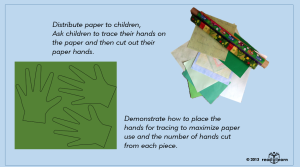The end of the school year in Australia is fast approaching; assessment is almost done and reports completed.
After a hectic year, thoughts are turning towards Christmas and the long summer holidays.
However the teaching and learning in the classroom doesn’t stop until the final farewells on the last day of school.
These last few weeks of the school year allow a little more flexibility and time for spontaneous explorations of children’s interests after the curriculum’s imposed learnings have been achieved. Sure, skills still need to be practised and extended but the pressure is not so relentless.
As the thoughts of most children are on Christmas and what they will do during the holidays, why not harness those interests and that excitement to make classroom learning meaningful and fun while developing important social and cultural concepts and understandings as well as practising and extending literacy and numeracy skills.
Over recent years there has been some controversy over whether Christmas should be included in school programs, some arguing that it is not inclusive and excludes those students whose cultural backgrounds neither recognise nor celebrate Christmas.
I have a number of reasons to support my argument that Christmas should be learned about in school, and my reference is to secular rather than religious celebrations which are best left to organisations dedicated to that purpose.
I would like to say that the main reason is that I love Christmas (the excitement, the anticipation, the decorations, the gift-giving, the celebrations with family and friends)!
But that would not be true.
My focus is educational:
- Cultural respect: Most children in Australian schools celebrate Christmas. Including Christmas in the classroom program acknowledges this and draws upon their interests and prior knowledge.
- Cultural awareness: Investigation of traditions celebrated by other class members, community groups or countries develops a recognition of other perspectives, including those who do not celebrate Christmas and those who celebrate other traditions such as Hanukkah, Ramadan or Chinese New Year.
- Cultural understanding: Learning about the traditions of the dominant culture in which one lives makes one more comfortable within that society, more able to converse about important events and holidays, and able to develop shared experiences i.e. helps to develop feelings of being included, rather than excluded by participating in the outward traditions. However, this knowledge does not necessitate participation or belief.
- Cultural acceptance: Learning to understand that, although not everyone shares the same beliefs or traditions, we all share a common humanity and that there is good in everyone is important for creating a peaceful and nonjudgmental world.
- Self-awareness: Christmas is a time for reflecting on the year’s achievements and behaviour e.g. whether you have been “naughty or nice” or whether you have worked hard are superficial questions which can lead to deeper introspection. This self-reflection can lead to celebration as well as to the setting of positive goals for improvement.
- Other-awareness: Recognising one’s own strengths can help to identify, recognise and appreciate the strengths and achievements of others.
- Emotional intelligence: Children learn to recognise and describe their own emotions, and the emotions of others. They understand that not everyone thinks and feels the same way about similar events and learn to respect the thoughts and feelings of others.
- Social-awareness: Recognising how others think and feel about certain events can develop feelings of empathy. Children are more likely to find common ground upon which friendships can be built.
- Being kind to each other: Christmas is all about sharing and giving. In a classroom these can lead to discussions about working cooperatively and collaboratively, getting along with each other, and giving the greatest gift of all: friendship.
- Enjoyment, recognition and fun! I couldn’t stop at 9, and I think the inclusion of fun in the classroom is one of the most powerful ways to engage and motivate learners!
Decorating the classroom is one way of setting the scene for explorations of Christmas traditions while encouraging the children to work cooperatively, take pride in their shared achievements and talk about how Christmas is celebrated (or not) in their families.
It became a tradition in my year one classroom to make a large 3D Christmas tree to adorn our classroom wall and become the focal point of our learning.
We would sit in front of it to have our discussions and read our stories.
To the display surrounding it, we would add child-made decorations, stories and poems they had written, holiday messages and gifts.
I would photograph each child in front of the tree, holding a sign with the message e.g. “Happy Christmas 2013”. These photographs would then be added to calendars which became a Christmas gift for parents.
The children loved doing the tree, partly because of the inherent excitement at the end of the school year with Christmas holidays imminent. But they also loved doing it because they were working together, making something meaningful to them; and as they worked together and saw the tree take shape, they realised that what can be achieved together is far more (as well as more fun) than they would have achieved on their own.
And while they were busily tracing and cutting, they were talking and sharing ideas and thoughts with each other and with me. We began to learn a lot about each other’s experiences, traditions and feelings.
Having made the tree together, the children had an enormous sense of collective pride in what they had achieved, especially when all those viewing it remarked upon how lovely it looked.
While I include instructions for making the tree here, they are also available from readilearn.
What do you think? Do you think Christmas should be celebrated in schools?
What reasons would you add to my list? What do you disagree with?
Leave a comment or indicate your thoughts below.













I do like your ten reasons. They are very nice ideas. I feel strongly, though, that schools should not celebrate Christmas. Unless it’s part of a “Holidays Around the World” unit, as mentioned above, and is only a PART of that unit. The unit should include other holidays. I don’t agree at all with celebrating only Christmas or having all the kids make Christmas ornaments or (oh this one REALLY gets me) having all the kids write to Santa. 😡 Also, mentioning other holidays in passing then decorating the entire classroom or school in Christmas decorations sends a strong message to students. Anyway, I usually steer clear of this stuff but here I am typing in my two cents.
LikeLiked by 1 person
Thanks for your comment, Sarah. I’m pleased you added your voice to the discussion. It is through listening to the opinions of others that we can develop a more informed position.
i would be interested to know, if you felt like sharing, and I know you said that you usually steer clear of it so don’t feel obliged, why you feel the way you do. Is it based on religious, cultural or other perspectives?
LikeLiked by 1 person
I’m breaking my own rule here as an Online Bartender but you’ve made me think about this.
It’s probably a combination of things. I would say I teach my children “tolerance” but now Bec has made me rethink that term. I mean it in all good ways but she is right: “we are taught that we are to ‘tolerate’ differences, as if differences are intolerable things and we should do our best to just put up with them. Rather than the emphasis being on celebrating the differences…” We should celebrate our differences. 🙂
LikeLiked by 1 person
I agree. That change in emphasis makes a huge difference to the way of thinking. Thanks for clarifying. 🙂
LikeLike
I think classes would benefit from exploring all of the December cultural traditions from around the world, including Christmas – it’s a great way to learn about different cultures and traditions. We celebrate Christmas in our house, but I love that my kids were learning about Diwali in school recently!
LikeLike
Hi Maryanne, Thanks for your comment. Yes, I agree. It is a wonderful opportunity to explore all December cultural traditions including though, not excluding, Christmas!
LikeLike
I’m facing a similar discussion though more in terms of cultural understanding and acceptance within the classroom. This is a really interesting conversation!
LikeLike
Hi, Thanks for your comment. I’m pleased you are finding it interesting. I am also. I’d be interested to hear about the views expressed in your discussions about cultural understanding and acceptance in the classroom.
LikeLike
I am embarking upon a “Holidays Around the World” unit with my students this December. I think that exploring holidays can be effective, if it is done well. It’s so important to bring students’ lives into the classroom, and I think seizing upon things that they find inherently interesting and exciting — like holidays — can make for meaningful learning. So many kids do not fully understand why they celebrate holidays, so it’s also important to expose them to the backstories and let them make their own decisions. I am trying to keep my instruction this holiday season geared more toward learning about what traditions mean and why they are important, but will be teaching details about 5 different holidays. By the way, your 3D tree sounds awesome!
LikeLike
Hi there,
Thank you for your comment.
I love the sound of your “Holidays around the World” unit. I certainly agree with bringing the children’s lives into the classroom. A unit like this is a great way of doing so, particularly if your students have different cultural backgrounds or countries of origin to share.I find we can learn so much about each other’s traditions and beliefs when sharing stories of holidays and celebrations. Are the five holidays you will be teaching about celebrated by some students in your class? I think that helps to make it so much more meaningful.
Thank you for commenting on my tree. I’d love to hear how you go if you try it.
LikeLike
Very interesting points, Nor, thanks for the read. I have different thoughts on the inclusion of Christmas in schools, but I like the spirit behind all of those reasons you described. Anything which encourages people to celebrate (rather than tolerate as we seem to be told we should have to do – why tolerate differences, how disheartening!) differences and build respect and sharing of friendship is a great thing.
LikeLiked by 1 person
Hi Bec,
Thanks for your comment. I am pleased to receive another viewpoint on this topic, which was totally expected. The issue does always encourage some discussion. I would be interested to hear your different thoughts on the inclusion of Christmas in schools.I am interested in your thoughts also about ‘tolerance’. I think sometimes we tend to do ‘tolerance’ a little too well in that we tend to place more importance on alternate or minority opinions and less value on our own. That indeed do I find disheartening.
I welcome further elaboration on your different thoughts should you wish to share them. 🙂
LikeLike
Hi again Nor, sorry I wasn’t very clear with my comment about tolerance. I mean that I find it disappointing that we are taught that we are to ‘tolerate’ differences, as if differences are intolerable things and we should do our best to just put up with them. Rather than the emphasis being on celebrating the differences, which I would much prefer. Some of the richest conversations I have participated in have been where differences in cultures have been discussed and the differences celebrated and highlighted, rather than avoided in case we couldn’t ‘tolerate’ them enough. I know from experience, of course, that you don’t emphasise tolerance in the classroom, and I mean that remark more generally about the discourse related to multiculturalism in Australia.
I also really enjoyed reading Rosie’s thoughts, and your responses to her thoughts too. An experience I had tonight was someone commenting that she could not wait to see what presents she would ‘get’ for Christmas. This disturbs me and I worry that it is these materialistic views that are reinforced when Christmas is taught in schools. But that comes from my own lens through which I view Christmas, and is also directed at an idea of how it could be constructed by others (i.e. those who want to ‘get’ something), and again not about your own approach to teaching.
This is a really interesting discussion, and I think it can also serve as a proxy discussion for other important issues in society about embracing differences, being inclusive, and deciding on which traditions we wish to keep and which we wish to discard.
LikeLike
Hi Bec,
Thanks for elaborating on your earlier comment and raising further issues for contemplation.
As you say, this issue is not a superficial one and has deeper implications for decisions that must be made in a democratic, multicultural and pluralistic society such as Australia. The way we deal with various situations that occur in our lives reflects our underlying feelings about many of these issues. Sometimes our true feelings lie hidden beneath statements expressing attitudes we believe to be true, only to be revealed when situations put them to the test.
I’m not sure how to take your statement about tolerance in the classroom but I guess you refer to attitudes which encourage acceptance, respect and appreciation; an attitude of “wonder” about how others think and feel, developing empathy from which genuine understanding, sharing and equality can grow.
I think Rosie shared your concern about the “get, get, get” focus of many at Christmas. For me, this is an important reason to show children that the feelings one can “get” from giving and sharing can often last longer and be more satisfying than those from things one “gets”.
Thank you for sharing.
LikeLike
Some considerations of raising expectations of how Christmas should be celebrated in the home and possibly raising expectations that parents can’t live up to. Consideration toward promoting consumerism and playing into the hans of big business. And…parents keeping children home from school because their beliefs do not coincide with those being promoted at school and therefore, children missing outon school.
I totally agree that planned effective learning finishes on the last day of school. We cannot claim there is an overcrowded curriculum (there isn’t but some claim there is) and then down tools two weeks before the end of the year.
Self assessment and learning about self-assessment is key learning at his time of the year.
LikeLike
Hi Rosie,
Lovely to hear from you again. Thanks for your comment. I did expect some alternative views when I posted this article and I am always pleased to hear them.Listening to the different viewpoints held by others helps to clarify and extend our own thinking. It may help to reaffirm what we think or open our thoughts to question and the development of more considered views leading to deeper understandings. This is one of the most important ways that growth in thinking occurs and, I think, a true purpose of education. In fact, this is exactly why I think children should learn about the traditions of different cultures at school, and Christmas is one of those traditions. Intercultural understanding, such as those I outlined in my article, rate highly in the General Capabilities of the new ACARA (Australian Curriculum, Assessment and Reporting Authority) curriculum documents.
I agree with your concerns about setting up expectations that parents would find it difficult to live up to, and concerns about promoting consumerism. Those concerns are why, in my classroom, the focus is upon developing an understanding of and appreciation for each other, recognizing that the greatest gift is a gift from the heart, of understanding, friendship and empathy. We do not discuss what they hope to “get”, we talk about what they can give, the positive thoughts, words and actions.
I guess I am fortunate that I have never had a child not attend school because parents did not wish them to participate in these valuable learning opportunities. Perhaps if I did, I would think differently about it. The parents of any students from cultures that don’t celebrate Christmas were always happy for their children to participate, even when I offered alternative activities, often being the ones who became most involved in and enthusiastic about the activities. It is definitely true that our own experiences help to shape our opinions, and I am grateful to you for sharing yours and encouraging me to think a little deeper.I look forward to hearing from you again. 🙂
LikeLike